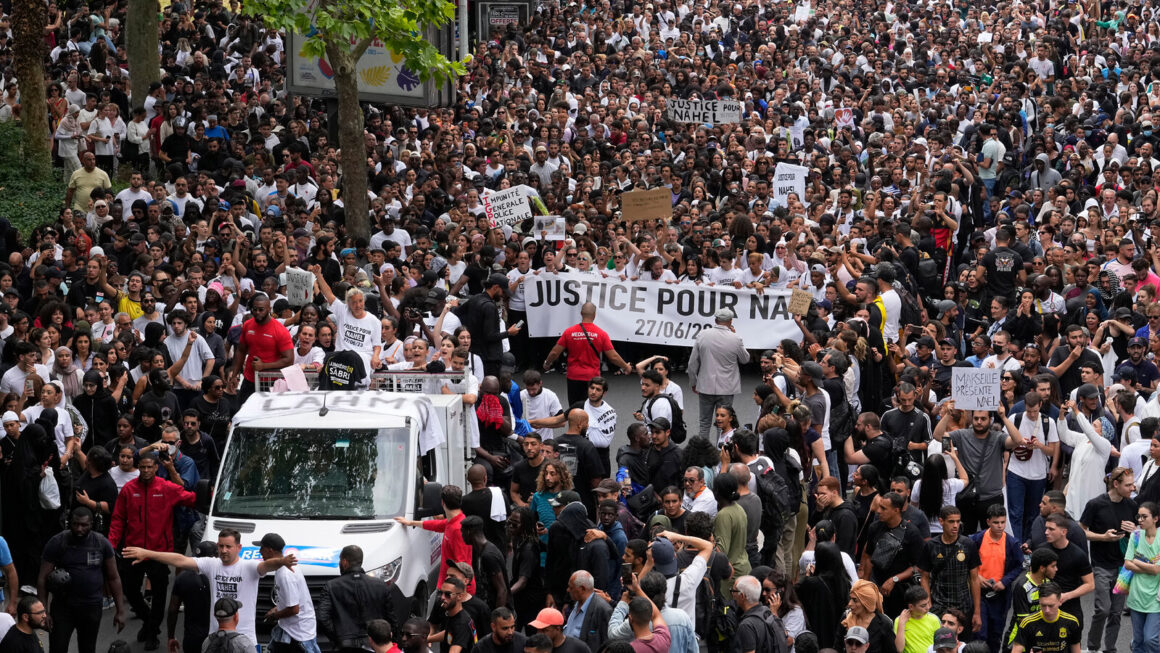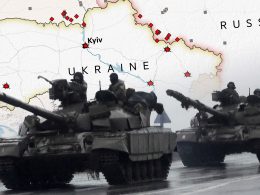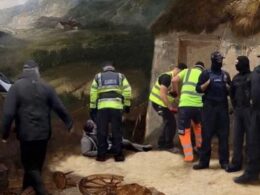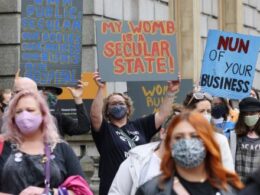Statement by International Socialist Alternative — our sister organisation in France
Let’s turn our anger into a mass movement in our neighbourhoods and workplaces!
The racist murder of young Nahel by a police officer in Nanterre (economically deprived suburb of Paris) on 27 June sparked a wave of indignation and revolt against systemic racism and incessant police violence, particularly against young people of North African or sub-Saharan origin. The spirit of the mass social movement against the pension reform, and the revolt of young people in the banlieues against oppression, must be combined and deepened to organise and build a mass struggle against racist police violence, and against the whole capitalist system.
The events are well known. During a police checkpoint, Nahel Merzouk, a 17-year-old teenager, was fatally shot by a policeman. The officer had threatened him with his gun a few seconds earlier, telling him to turn off the engine or “I’ll shoot you in the head”. In panic and fear, Nahel started his car. The bullet passed through his shoulder and chest, leaving him no chance of survival. The story could have ended there, as it has so many times in the past. The police would have pleaded self-defence in the face of a vehicle “ramming” a policeman. But a video captured the scene and immediately revealed the police lie.
Nahel joins a long list of young men of North African or sub-Saharan African origin killed by police. 15 days before Nahel, another young man, Alhoussein, 19, was killed by the police in Angoulême on his way to work.
For these young people, injustice is not just a feeling. Cases are often dismissed and murderous police officers rarely convicted. The fear of being confronted by a police checkpoint is matched only by hatred for the institutions of a system that exists only to oppress and humiliate these young people from the banlieues (economically deprived neighbourhoods).
This revolt is the voice of the unheard. To make them and all other victims of police violence heard, and to obtain justice, requires building a mass movement of struggle. The trade union and political left must engage in active solidarity.
Macron accumulates crises
Nahel’s murder is yet another crisis for the “Macronie”, forced to admit there is a problem. “Inexplicable” and “inexcusable”, Macron was forced to declare following the filmed murder of the young man. This clearly didn’t please reactionary police unions like Alliance, who felt let down by the President — making this one more crisis for Macron to deal with.
Nahel’s murder has also put the far right in a difficult position. In Marine Le Pen’s Rassemblement National (RN) programme, for example, we find that police officers and gendarmes could use force under a presumption of self-defence. Such a presumption already exists in many cases, but the RN wants to make it indisputable in all cases, as well as, for example, making it impossible to lodge a complaint against police officers. Suffice to say, that when journalists handed her the microphone after Nahel’s death, Le Pen supposedly “hadn’t seen the video yet”.
But for the right and the far right, every crisis often presents an opportunity. And this opportunity was not long in coming, with reactionary forces seeking to utilise the revolts that began in the neighbourhoods following this latest police murder, to whip up tension and racism.
“A riot is the language of the unheard.” — Martin Luther King
From the very first night after Nahel’s murder, thousands of young people, mainly of immigrant origin, rioted in the banlieues of major French cities. Numerous references are made to the 2005 uprisings following the deaths of youngsters Zyed Benna and Bouna Traoré during police action in Clichy-sous-Bois.
But these comparisons often overlook an important fact: a lot has changed since 2005, and not just the ubiquity of social media use.
Above all, the last 20 years have seen the lack of investment in public services worsen year after year. The policies of austerity and budget cuts that have defined the neoliberal era since the early ’80s have caused immeasurable harm. This is particularly true for the economically most vulnerable. So much so that in some neighbourhoods, retired people living in low-income housing with too little income to pay the rent are helped financially by younger people so they can continue living in their own neighbourhood .
Back in 2005, this lack of a positive future was already evident for large sections of young people living in these areas, particularly those of immigrant origin. But what prospects are we talking about today? Things have gotten worse. Frustration and anger are greater and more widespread than ever. Reducing the current explosion of anger to social media or “video games” (as Macron ridiculously put it) is, above all, an attempt to minimise its social causes. This anger has spread so rapidly across France, and not just to the biggest cities, this is because these social causes are systemic and can be found everywhere.
In the current uprisings in the banlieues, the police have been confronted with young people who have been discriminated against and humiliated from an early age, a process accentuated during the covid-19 pandemic. There’s no doubt that these young men experienced racial profiling only recently.
But the response from the authorities boils down to “more of the same”. Once again, more “security”, with record police mobilisations, troops arrogantly parading through the streets of the banlieues, and even the dispatch of units dedicated to hostage management or anti-terrorism (BRI, GIGN, RAID). Curfews and evening closures of public transport were also introduced. At the same time, the French Minister of Justice, Éric Dupond-Moretti, has sent a directive to the public prosecutor’s office calling for “a rapid, firm and systematic penal response” against young people arrested during spontaneous demonstrations.
There’s no better way to fuel the fire, when young Nahel’s death is only a couple of days old. As if more security were going to solve an explosive cocktail of discrimination and racist humiliation created by institutions and the loss of bearings and a future.
With police violence, the authorities are very consciously aiming to stimulate more violence from young people in revolt, to divert attention and try to sow discord and division within the working class and oppressed masses.
This authoritarian government response gives a strong boost to far-right organisations. The reactionary Alliance and Unsa Police unions added even more fuel to the fire, with a racist statement on 30 June calling for tougher repression: “Faced with these savage hordes, asking for calm is no longer enough, we must impose it!”; “Now is not the time for union action, but for combat against these ‘pests’”; “Today the police are in battle because we are at war. Tomorrow we will be in resistance, and the government must realise this. (note that UNSA Education and the UNSA General Secretary condemned the press release). It’s a reflection of a polarisation that exists and is being consciously fostered: a fund in support of the policeman who fired the fatal shot has raised over €1.6 million from more than 85,000 donors (as of 5 July). It was launched by far-right politician Jean Messiha, ex-member of the RN and then ex-supporter of Éric Zemmour.
Racist, social and police violence cause violence from the movement
Uprisings in the neighbourhoods include episodes of break-ins, arson and looting. It’s important to clarify before anything else: the primary violence is racist and socio-economic, and comes from the policies pursued by the system and today by Macron. These are the policies that stimulate anger and its expression in different ways, and therefore also stimulate violence on the part of some of those in revolt.
Secondly, the violence comes from the forces of law and order: racist police violence. This on top of the everyday racism & socio-economic violence of the State are the real root cause of the violence in the neighbourhoods.
The government and the far right are taking advantage of this today, but it’s all too easy to hide the problems of the system behind these outbursts. They are also the consequence of the politics pursued over recent decades and accentuated by Macron, and therefore of the hatred that exists towards institutions. The main targets are the buildings most representative of the institutions of the system, such as town halls and police stations, as well as the buildings of major commercial chains, alongside other things broken or set on fire.
It’s largely understandable that violence would come from a section of incensed youth. It’s an expression of blind rage against the system, but of course it’s not a solution. For these neighbourhoods, already deserted by public services and suffering from social exclusion and poverty, it’s a double whammy: it’s often public property that’s affected, such as buses, social housing, schools, pharmacies, but also cars belonging to the residents of the same areas. Sadly, it’s our class, our homes and neighbourhoods, that suffer the consequences of attacks on property that could benefit the whole community, therefore bringing division into our communities.
Such elements of smashing, burning and looting can also be seized upon by the opposite camp — so they can divide us, curtail our freedom further and harden the repressive apparatus of the State. It is precisely those elements of rioting that the ruling class can then use, through the mobilisation of all their arsenal, and particularly of the dominant media, to direct them against the revolt, towards division and to even ensure the reasons for this revolt’s existence are forgotten.
In the end, all this smashing, burning and looting weakens the protests. It’s only through strength in numbers and unity in the struggle of the entire working class and youth that we can start to reach real solutions.
When the State “takes care” of the youth, it is to humiliate them
Since taking office in 2017, Macron has been launching full frontal attacks on workers and youth with austerity policies and attacks on union rights. But he has also been accompanying this class war with an increase in the authoritarianism of the State forces, all the while encouraging systemic racism. When you attack the majority of the population, it’s better to divide and conquer.
Macron’s political brutality against workers and young people has been a stepping stone for the growth of the Rassemblement National (RN). State racism and permanent stigmatisation have increased: from a rake of islamophobic laws, to the hunt for “Islamo-gauchisme” (linking Islamophobia with anti-left propaganda)… Macron and his government have never stopped stocking up divisions and stealing the clothes of the far right.
It is precisely this context in which Marine Le Pen is leading in the polls, despite the recent powerful social movement against the pension reform. Macron and his ministers want the RN to be seen as the “real” opposition. That explains why it is his government who — far more than the RN — are consciously fostering racism and division, notably with the Olympic 2024 law, the future immigration law, the racist military operation against Comorian immigrants in Mayotte (“Operation Wuambushu”), and of course again today, with the authoritarian and racist response of Darmanin and his police to the revolts in the banlieues neighbourhoods.
The neoliberal policies pursued in particular since Mitterrand’s “austerity turn” in 1983 and in the decades that followed have gutted public services, with concrete consequences experienced everywhere, but especially in socially deprived neighbourhoods where poverty is accumulating. Substandard housing, difficult job prospects, lack of access to healthcare and basic public services: there more than anywhere else, disinvestment in all aspects of life is cruelly felt. The lack of prospects for the future is the common denominator for many of the young people living in these neighbourhoods. And in an attempt to mask this poverty and lack of prospects, the system is all the more dependent on the weapon of division, particularly racism.
The aggressive attitude of the police in poor neighbourhoods where a disproportionate number of people from migrant background live is designed to keep people trapped in substandard housing and schools, and to keep them in a form of segregation. And racist politicians seek to present these populations as a threat to the “white” strata among the working and middle classes in order to gain wider support for their repressive policies.
“There is no capitalism without racism” — Malcolm X
In this society, racism is systemic. Like the other oppressions that plague society (particularly sexism and LGBTQIA+phobia), racism is a weapon consciously used by the ruling class and its political representatives to impose its policies more easily by avoiding having to confront a united working class.
The French State has always excelled at this. From the introduction of slavery on the basis of the triangular trade with the Antilles, to the assassination of Nahel, the French authorities have always applied policies that lock people of colour into a status of inferiority — for a long time openly, today no longer in law but always in practice.
Racial profiling is no myth: In France, a black person or a person of North African origin is 6 to 7 times more likely to be stopped and searched than a white person. Add to this the fact that young people aged 18–25 are 7 times more likely to be stopped than the average population, and statistics show that a young man of black or North African origin is 20 times more likely to be stopped. This is just one study, probably underestimating reality.
Racism is systemic, and not just in police checks: many face discrimination when applying for jobs or trying to access housing, and socio-economic difficulties in trying to access education and training, meaning they are underrepresented in jobs with better working conditions and pay, and overrepresented in lower-paid unskilled jobs, etc.
Racist and police violence — the promise of injustice
It’s a fact that police use of weapons as well as police killings have increased under Macron, even though the adoption of the law on police use of weapons was introduced in February 2017 under Hollande, by Prime Minister Bernard Cazeneuve, just before Macron came to power. From 2017 to 2021, the use of weapons by police officers increased by 26% compared to 2012–2016. The increase is even 39% for the use of weapons against a vehicle.
But the change in the law is not the only accelerator of police violence. Gérald Darmanin’s appointment as Minister of the Interior has turned the tide on murderous violence: As the online magazine Basta! points out, since 2020, the number of people killed by police shootings has doubled; and three times as many people have died following an arrest.
Convictions against police officers who kill are extremely rare. That being said it isn’t impossible to imagine that given the existence of a video and given the existence of pressure from below, Nahel’s killer would be convicted. All the more so as he was very quickly abandoned by part of the police hierarchy and by the political authorities, who are playing up the strategy of the “isolated violent policeman”, in an attempt to avoid the whole institution being exposed. But young people in the banlieues are well aware that this is not a problem of some “bad apples” within the police force, but of widespread racist violence, stimulated by the political authorities and within the police force itself.
The government may hide behind the usual “let justice do its job”, but many of us know that in this kind of case, as in many others, justice does not do what is expected of it. In a society composed of different social classes with antagonistic interests, the role of the various institutions is ultimately to defend the ruling class. In our society, this is the capitalist class. And it is indeed a class-biassed justice system that we are dealing with.
The role of the state; the role of law enforcement agencies
As Friedrich Engels explained over a hundred years ago, the emergence of the repressive apparatus of the State — army, police, prisons, etc. — historically reflects the division of society into social classes with antagonistic interests that cannot be reconciled. The State is made up, in Engels’s words, of “special detachments of armed men”, who keep the class conflict “within the bounds of order” but ultimately defend the interests of the ruling class. Repression and the threat of violence are an integral part of protecting the wealth and domination of the ruling class in an unequal society like ours.
That’s why repression by the armed wing of the capitalist state is rife against any social movement that threatens the interests of the ruling class. The police rampage against the Gilets Jaunes movement at the end of 2018 and in 2019 injured 25,000 demonstrators, including 353 in the head, 30 who lost an eye and 6 who got a hand torn off; as well as the death of Zineb Redouane, an Algerian 80 year old woman who lived in Marseille.
The powerful social movement against the pension reform was also subjected to huge police repression, with a SUD Rail trade unionist in Paris shot through the eye by a crowd dispersal grenade, and a special needs teacher (AESH) getting her thumb ripped off by an explosive grenade in Rouen. In sectors and companies where workers have been on strike (refineries, waste collection and treatment, etc.), the violence of the capitalist state has also been illustrated, through its justice and police forces, with the breaking up of picket lines and the requisition of personnel to restart work.
During the pandemic, healthcare workers were officially applauded by the authorities, but when they demonstrated for more resources and staff, the response was invariably truncheons and tear gas.
Also the youth, particularly in recent years, has been strongly targeted by police repression. The ruling class is well aware of the risk of young people rising up and pulling whole layers of the working class behind them in solidarity. When they mobilise against anti-environmental policies, as with the actions against the mega-basin Saint-Soline for example, or against Macron’s arrogant and anti-democratic measures during the movement against the pension reform, they come under direct attack. Tear gas, batons, rubber bullet guns, crowd dispersal grenades, police charges against groups of people protesting, arbitrary arrests and police custody are all employed to repress and quell the movement.
In March, an audio recording showed that arrested young demonstrators had been struck, intimidated, insulted (including racist insults) and physically threatened by police officers from the BRAV-M (Motorised Brigades for the Repression of Violent Action). There were also reports of young women being sexually assaulted while being taken to a police station. The aim of all this is to scare and silence social movements.
The police cannot be “abolished” in a capitalist society. As long as capitalists are in power, they will have to find a way to protect their interests and property. Nor is it possible to create a “non-racist” police force as long as institutional racism and segregation remain intact in society. Small improvements can sometimes be won, on the basis of struggle, but the solution is to get rid of capitalism itself.
For a mass movement of the working class and youth against the violence of the system!
The workers’ movement needs to play a role in getting actively involved to help the organising and channelling of all the anger and energy which for now is taking the form of smashing and looting. This anger must be directed not at public buildings and stores of large retail chains, but at what lies behind them: the system itself, which creates the conditions for violence to exist, and feeds from it.
In mid-June, the inter-union coalition declared the end of the movement against pension reform. A powerful social movement, which did not achieve the withdrawal of the reform, but which has weighed and will continue to weigh heavily on the social and political atmosphere during Macron’s remaining four years in office. In reality, the battle over the pension reform is not over, and September could mark the renewal of the trade union struggle, on pensions or other issues. The potential for struggle will remain explosive, with a numerically and qualitatively reinforced vanguard alongside broad layers of workers enriched by this historic battle who have regained confidence in the strength of collective struggle. All this potential must be brought into a mass struggle against oppression, indignity and racist and police violence.
At the end of May 2020, the racist murder of George Floyd by police in the US had reignited the Black Lives Matter (BLM) movement. Echoing BLM in the US and opposing systemic racism and police violence in France, tens of thousands of people had mobilised, particularly at the call of the “Truth for Adama” committee. A year later, another 150,000 people took to the streets across France. The structural nature of racism and police violence is increasingly visible and widely recognised. The Black Lives Matter movement has made it possible to challenge the official propaganda. It’s a basis upon which to build further.
The thousands of people present at the White March organised in Nanterre on 29 June in tribute to Nahel reflect the will to mobilise for truth and justice, and for things to change. Such mobilisations can serve as an example. The organised labour movement must turn to these layers of youth, often not unionised, to broaden the struggle to all layers of the working class, provide methods of struggle and show prospects for pushing back the state authorities and the far right, and a strategy to win.
To build the necessary balance of forces, we need to bring together and organise all those who want to fight racism, because it’s through collective action and mass mobilisation that victories can be achieved. And what unites us is that we are all victims, to varying degrees, of a shortage of social resources (lack of social housing, lack of decent jobs, lack of resources in public services, etc.) and of the exploitation that stems from the capitalist profit system.
A programme that leaves no one behind
All too often, trade union organisations still tend to concentrate on their “strongholds”. However, while these can and must be the driving force, it is absolutely crucial to seek to draw into their wake the less mobilised sectors and strata, in particular the youth, and especially in the working class areas. This has been one of the missing pieces of the movement against the pension reform, but it remains a crucial one in the building of an ambitious anti-racist struggle.
During the movement against the pension reform, we proposed to set up anti-Macron strike committees everywhere, in workplaces, schools and universities, as well as in working class and poor neighbourhoods. Broad-based committees, open to all, to build the struggle democratically at the grassroots level, involving everyone actively in its preparation and organisation. If such committees had been set up, they could now serve as a springboard for taking the revolt against state racism to another level.
Many union activists are now actively engaged in solidarity with the victims of racist police violence. But this is much less the case for the union leadership themselves. Trade unions and their activists have a major role to play in building a mass movement that actively involves all layers of the working class, youth and oppressed.
We must respond to every racist attack with mobilisation: a collective mass mobilisation, which must in fact oppose all the daily racist policies of which banlieues are the main victims. This is also the case for those in “Overseas France”, whose management by the French state is a direct vestige of its colonial empire. “A riot is the language of the unheard” said Martin Luther King. Let’s give a voice to the unheard through active solidarity and the building of a mass movement against structural racism. It’s impossible to solve the problem by relying on state institutions that perpetuate systemic racism.
The anger must be rallied around the workers’ movement, defending a programme that fights austerity and racism through solidarity. We need a mass united struggle of the working class, youth and oppressed, armed with a programme of demands to impose what the ruling class refuses to put in place: truth and justice for all victims of racist police violence; demilitarisation of the police, dismantling of the most reactionary units like the Anti-Crime Brigades (BAC) and the BRAV-M, and democratic control of the police forces by working-class communities, poor neighbourhoods, key sectors of the economy and unions as a way to put an end to police brutality.
A crucial demand is for massive public investment in disadvantaged neighbourhoods: in public services, housing and access to well-paid jobs for all; in education, access to health care, culture and sport; in associations and community centres. France Insoumise is right to put forward such a demand as part of its “Justice everywhere” emergency plan (see here).
Working conditions and pay must change. A minimum is to defend an immediate 10% increase in all wages and the return of the sliding scale wages abolished by Mitterrand in 1983 to cope with inflation. Guaranteeing access to education for all also implies the introduction of a student wage equivalent to the minimum wage. As for the low-wage sectors, let’s place them under public control to ensure real benefits for workers, with good wages and working conditions. We need a guaranteed job and free time, and therefore a collective reduction in working hours, without loss of pay, with compensatory hiring and a reduced work pace.
France Insoumise activists and trade unionists have a role to play in building a unified movement of struggle. Mélenchon scored exceptionally well in the banlieues in the 2022 presidential election, even if the NUPES alliance that followed undermined some of the support. This alliance has not been supported by everyone, especially in socially deprived neighbourhoods, as it involves political groups and figures who have themselves been involved in maintaining the system through local policies against the interests of the inhabitants of these neighbourhoods.
For a revolutionary socialist struggle
Living in a society where no one has to fear state repression and racism means getting rid of capitalism. The only way to meet the social needs of all without discrimination will be to hand power back to the social majority.
Let’s put an end to capitalist exploitation of the two sources of all wealth — workers and nature — by nationalising the key sectors of the economy under democratic control and management. In this way, it would be possible to move towards a democratically planned economy that would lay the foundations for the elimination of all oppression, exploitation, violence, inequality and injustice. This is the goal of revolutionary socialism: to overthrow capitalism and consign racism, sexism, LGBTQI+phobia and other forms of discrimination and oppression to the dustbin of history.












